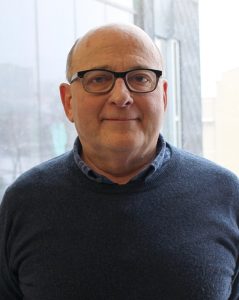By Andreas Yilma Citizen’s News
NAUGATUCK — Borough native and computer science professor Robert Harper brings honor to his hometown by earning the highest award in his professional field.
Harper, 64, officially received the 2021 ACM SIGPLAN Programming Languages Achievement Award in January. It’s a career-length award for research in programming languages and is considered the highest award in that field worldwide. He received a plaque and a $5,000 monetary award.
The Association for Computing Machinery Special Interest Group on Programming Languages explores programming language concepts and tools, focusing on design, implementation, practice and theory. Its members are educators, researchers, programming language developers and theoreticians, according to the website.
Harper, a computer science professor for 34 years at Carnegie Mellon University, said he was happy when he learned of his achievement.
“I was completely surprised, to be honest,” Harper said. “I just hadn’t thought about it. It wasn’t on my mind.”
ACM is the world’s largest scientific and educational computing society with more than 100,000 members.

The organization has a subgroup called the Special Interest Group in Programming Languages. The society does many things in the field, including organizing journals and meetings, fostering participation and sponsoring conferences and journals.
Haper said it’s the whole world of computing.
“They do every possible thing as far as all types of things for computing,” Harper said.
Harper said he is known for foundational contributions to the understanding of type theory and its use in the design, specification, implementation and verification of modern programming language.
“Type theory is the codification of the reasoning and principles that are essential to the development and maintenance of programs,” Harper said. “It’s the logical foundation of software. This has enormous ramifications.”
His career achievements include the analysis of language features ranging from references to continuations to modules, the definition of a variety of new type systems, the idea of using types throughout the compilation process and the analysis of runtime system semantics and cost.
Harper said the award represents work by himself, by students and many of his colleagues. There are many people who are involved and who influenced him, he added.
“It’s not solely me. I’m just an accomplished researcher. I’m rather proud of that.”
Harper said previous awardees are people he looked up to in his career.
“People I hold in awe, I join their ranks in that regard,” Harper said. “I felt like wow, that’s pretty good.”
Harper was also named an ACM Fellow in 2005 for his contributions to type theory. This award is for the top 1% of ACM distinguished members for their outstanding accomplishments, according to the organization’s website.
Harper lives in Pittsburgh with his wife, Stephanie Balzer. He was born and raised in the borough and graduated from Naugatuck High School in 1975. He later went to Rochester Institute of Technology for his undergrad before he obtained his Ph.D. from Cornell and his post-doctoral fellowship from the University of Edinburgh in Scotland.
Although Harper lived in Naugatuck only until he was 18, his mother and aunt both still live there.
He said he got started in computing on a fluke during high school. His geometry teacher at the time, Paul Cieslewski, purchased a minicomputer that was the size of a small fridge.
“He had one of his minicomputers in his room and I was attracted to that magnetically,” Harper said. “I tried to figure out how to program that.”
Harper said he soon started playing with computers and investigating how they work. The rest is history.
“As I matured, I realized I was more driven by the aesthetics of programming,” he added.













